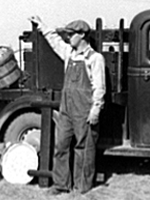
Muñoz, Jesse and Muñoz, MarthaAboutMartha's childhood memory of German prisoners of war working on irrigation ditches during World War II. Discusses a neighbor's memory of working alongside Italian prisoners of war who sang as they worked in the field. Jesse picked cotton alongside Italian and German POWs on a Texas farm where his father was a foreman during WWII.
Abstract
Tape 1, Side A
Martha Muñoz: As a child of four, living with her grandparents, she noticed a group of men working on an irrigation canal nearby. They were wearing khaki shorts and no shirts. Her grandmother cautioned her that they were "Germans." The POWs planted carrizo (bamboo) for erosion control. The consultant's father was serving in the armed forces guarding prisoners of war in the Philippines. Martha discusses a neighbor, Magdalena Hinojosa, who was twelve years old during the war. Magdalena remembers being cautioned not to go out with her sister to the area where the German POWs were dropped off for work. Magdalena picked cotton alongside Italian POWs, and remembers them singing while they worked. Magdalena's mother trusted the Italian POWs more than the German POWs. Martha believes her husband, Jesse, has additional information about the POWs. The Muñoz's contacted the Museum as a result of an article about the POW project in the El Paso Times.
Tape 1, Side B
This side of the tape was not used.
Tape 2, Side A
Jesse Muñoz: He first became aware that POWs were available to do farm work in 1942 or 1943. His father was a foreman on a cotton farm. Fifteen to twenty Italian POWs were picked up at 6:00 am and transported to the farm in a pickup. The POWs and other workers were not supposed to talk to one another in the fields, but Jesse talked to the POWs anyway. Sometimes the POWs slept in the rows between the cotton plants. The POWs brought "barrels" of tea with them to the fields and would share it with him. Jesse believes the POWS had a quota of seventy-five pounds of cotton that they had to pick, which wasn't difficult to achieve; however, it sometimes took them the entire day. At times some POWs exceeded their quota. The guards were armed with rifles. Sometimes the POWs sang while picking cotton. Although German POWs were also employed as laborers on the farm, he remembers more about the Italian POWs. In addition to tea, the Italian POWs also shared French bread with him. He isn't sure whether the guards would have "detected" the fraternization that was occurring in the fields between the POWs and other workers. The only time the POWs were at the farm was during cotton harvest. Describes the POW camp at Fabens, Texas, that was surrounded by barbed wire and armed guards. He was not afraid of the POWs. He believes the Italian POWs were, as a rule, happier than the German POWs. |

